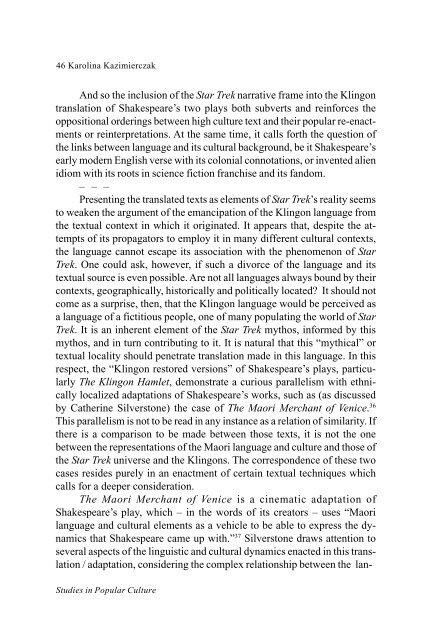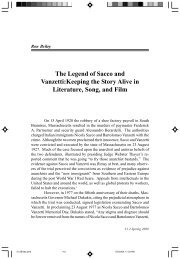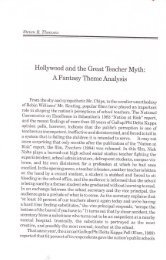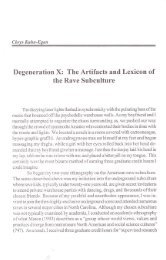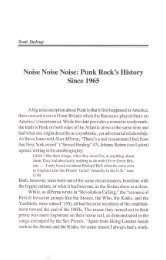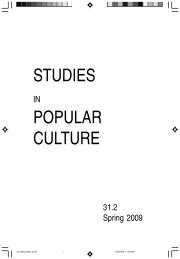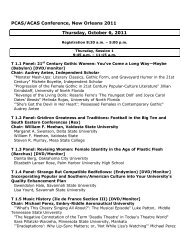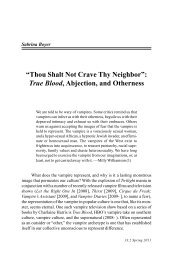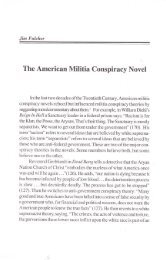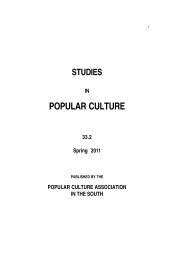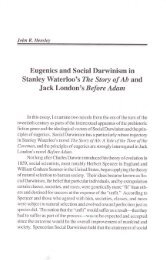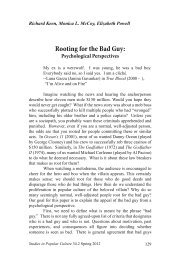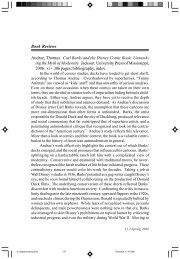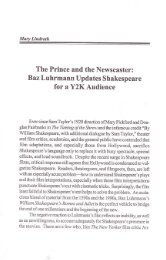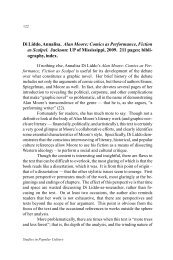Adapting Shakespeare for Star Trek and Star Trek for Shakespeare ...
Adapting Shakespeare for Star Trek and Star Trek for Shakespeare ...
Adapting Shakespeare for Star Trek and Star Trek for Shakespeare ...
You also want an ePaper? Increase the reach of your titles
YUMPU automatically turns print PDFs into web optimized ePapers that Google loves.
46 Karolina Kazimierczak<br />
And so the inclusion of the <strong>Star</strong> <strong>Trek</strong> narrative frame into the Klingon<br />
translation of <strong>Shakespeare</strong>’s two plays both subverts <strong>and</strong> rein<strong>for</strong>ces the<br />
oppositional orderings between high culture text <strong>and</strong> their popular re-enactments<br />
or reinterpretations. At the same time, it calls <strong>for</strong>th the question of<br />
the links between language <strong>and</strong> its cultural background, be it <strong>Shakespeare</strong>’s<br />
early modern English verse with its colonial connotations, or invented alien<br />
idiom with its roots in science fiction franchise <strong>and</strong> its f<strong>and</strong>om.<br />
– – –<br />
Presenting the translated texts as elements of <strong>Star</strong> <strong>Trek</strong>’s reality seems<br />
to weaken the argument of the emancipation of the Klingon language from<br />
the textual context in which it originated. It appears that, despite the attempts<br />
of its propagators to employ it in many different cultural contexts,<br />
the language cannot escape its association with the phenomenon of <strong>Star</strong><br />
<strong>Trek</strong>. One could ask, however, if such a divorce of the language <strong>and</strong> its<br />
textual source is even possible. Are not all languages always bound by their<br />
contexts, geographically, historically <strong>and</strong> politically located? It should not<br />
come as a surprise, then, that the Klingon language would be perceived as<br />
a language of a fictitious people, one of many populating the world of <strong>Star</strong><br />
<strong>Trek</strong>. It is an inherent element of the <strong>Star</strong> <strong>Trek</strong> mythos, in<strong>for</strong>med by this<br />
mythos, <strong>and</strong> in turn contributing to it. It is natural that this “mythical” or<br />
textual locality should penetrate translation made in this language. In this<br />
respect, the “Klingon restored versions” of <strong>Shakespeare</strong>’s plays, particularly<br />
The Klingon Hamlet, demonstrate a curious parallelism with ethnically<br />
localized adaptations of <strong>Shakespeare</strong>’s works, such as (as discussed<br />
by Catherine Silverstone) the case of The Maori Merchant of Venice. 36<br />
This parallelism is not to be read in any instance as a relation of similarity. If<br />
there is a comparison to be made between those texts, it is not the one<br />
between the representations of the Maori language <strong>and</strong> culture <strong>and</strong> those of<br />
the <strong>Star</strong> <strong>Trek</strong> universe <strong>and</strong> the Klingons. The correspondence of these two<br />
cases resides purely in an enactment of certain textual techniques which<br />
calls <strong>for</strong> a deeper consideration.<br />
The Maori Merchant of Venice is a cinematic adaptation of<br />
<strong>Shakespeare</strong>’s play, which – in the words of its creators – uses “Maori<br />
language <strong>and</strong> cultural elements as a vehicle to be able to express the dynamics<br />
that <strong>Shakespeare</strong> came up with.” 37 Silverstone draws attention to<br />
several aspects of the linguistic <strong>and</strong> cultural dynamics enacted in this translation<br />
/ adaptation, considering the complex relationship between the lan-<br />
Studies in Popular Culture


